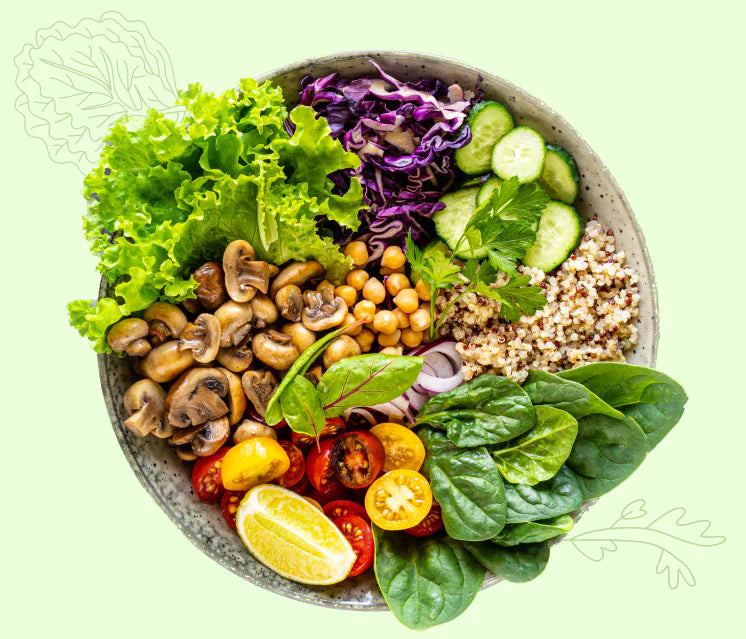Call Us 123456789
Free delivery on order over $200
The Environmental Impact of Vegan Diets: A Dubai Perspective
Buy meal plan
Dubai, a bustling metropolis renowned for its luxury and rapid development, is also becoming more conscious of environmental sustainability. As residents seek ways to reduce their carbon footprint, adopting a vegan diet has emerged as a powerful solution. This blog delves into the environmental benefits of vegan diets, highlighting how vegan diet meal plans, such as those offered by Plant Power, can contribute to a greener future.
Impact on Carbon Emissions: How Vegan Diets Help
A vegan diet significantly reduces greenhouse gas emissions compared with meat-based diets. Animal agriculture is a leading source of methane and nitrous oxide, potent greenhouse gases. By opting for vegan diet meal plans, individuals can minimize these emissions. Studies show that plant-based foods require less energy and land, leading to a lower carbon footprint. Growing vegetables and grains generates significantly fewer greenhouse gas emissions compared to raising livestock. Transitioning to a vegan diet is a practical step toward mitigating climate change and fostering environmental sustainability.
Water Savings: Key Advantages of a Vegan Lifestyle
Vegan diets are associated with substantial water savings compared with diets rich in animal products. Producing plant-based foods requires significantly less water; for instance, growing a kilogram of vegetables uses only a fraction of the water needed to produce a kilogram of beef. Livestock farming demands vast amounts of water for hydration, feed crops and cleaning. In contrast, crops like grains, legumes and vegetables have a much smaller water footprint. By choosing a vegan diet, individuals in Dubai can help conserve one of the planet's most precious resources, especially important in water-scarce regions.
Efficient Land Use: Optimizing Resource Allocation
Vegan diets are more land-efficient than animal-based diets, requiring considerably less land to produce the same amount of food. This efficiency is particularly vital in arid environments like Dubai, where arable land is limited. Reducing the need for large grazing areas and feed crops, vegan diets help conserve valuable land resources. This promotes more sustainable urban planning and protects natural habitats. In a region where land is scarce, adopting plant-based diets leads to more efficient resource use and a reduced ecological footprint.
Minimizing Pollution: Achieving Fresher Air and Water
Farming with plant-based methods lowers pollution levels, helping to create cleaner air and water. Unlike livestock farming, which releases substantial amounts of methane and ammonia, plant-based farming produces fewer greenhouse gases and pollutants.. Additionally, the reduced use of pesticides and fertilizers in vegan farming minimizes runoff into water bodies, protecting aquatic ecosystems and reducing soil contamination. In Dubai's fragile environment, where water is scarce, reducing pollutants is essential for preserving water quality and safeguarding local ecosystems.
Preserving Biodiversity: Safeguarding Ecosystems and Wildlife
Reducing meat consumption helps preserve biodiversity by decreasing the need for expansive agricultural land. Vegan diets lower the demand for grazing areas and feed crops, allowing natural habitats to thrive. In Dubai, this means safeguarding fragile desert ecosystems and their unique species. The Arabian Oryx and Sand Gazelle, for example, benefit from preserved habitats, while native plants like the Ghaf tree flourish without being cleared for agriculture. Adopting plant-based diets helps preserve local biodiversity and supports the survival of native species.
Cutting Food Waste: Embracing a Sustainable Lifestyle
Vegan diets inherently produce less food waste due to more efficient resource use in growing plants compared with raising animals. Fruits, vegetables, grains and legumes typically last longer and are more fully utilized. To reduce food waste in our vegan meal prep, we purchase only necessary items and store produce properly to extend freshness. Composting scraps can enrich garden soil, further contributing to a sustainable, waste-free lifestyle that benefits both the environment and your finances.
Community Efforts: Dubai’s Commitment to Eco-Friendly Living
Dubai is promoting sustainable living through initiatives that encourage plant-based diets. The Dubai Municipality's "Sustainable City" project fosters green practices, including plant-based eating. Farmers' markets and urban gardening initiatives are improving access to fresh, plant-based foods. Community events like vegan festivals and workshops raise awareness of the benefits of plant-based diets. Collaborations with local vegan meal services, such as Plant Power, support these efforts by providing convenient, eco-friendly meal options. These initiatives help reduce the city's carbon footprint and promote a healthier lifestyle for residents.
Conclusion
Switching to a vegan diet in Dubai provides several environmental advantages, including lowering carbon emissions, conserving water, protecting biodiversity, and minimizing pollution. By being aware of these effects, Dubai residents can make informed decisions that help create a more sustainable future. Plant Power is dedicated to supporting this transition by offering delicious, eco-friendly vegan meals delivered to your doorstep. Embracing a plant-based diet not only enhances personal health but also plays a crucial role in safeguarding our planet.
What are you waiting for?
It’s time to kickstart your health journey with nourishing and delicious meals to boost your energy and overall health!
